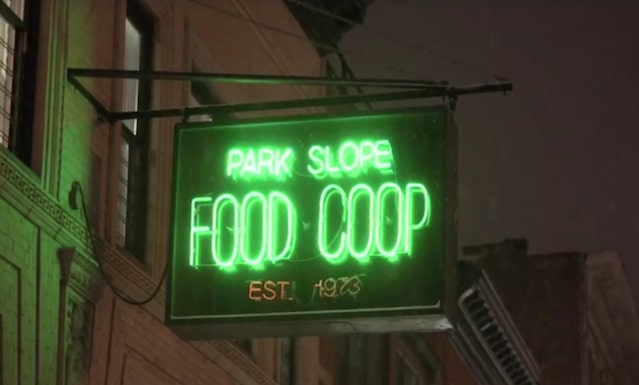
It is not every occasion that we screen films that leave viewers feeling optimistic about a specific cause after the credits roll. With its charming frankness, no frills aesthetic, and presentation of honest, hard-working and inspiring people, Tom Boothe’s 2016 film, FOOD COOP, manages to delve into political economy while leaving audiences inspired and stoked about the subject at the same time.
In his highly entertaining and informative doc, Boothe enters the world of Brooklyn’s legendary and oldest food cooperative – the Park Slope Food Coop. It is an enchanting and delectable journey into an alternative economic model, and a quirky and engaged community.
Founded in 1973, the Coop has nearly 17 000 members, who, by nature of membership, are also part owners. The concept is simple: If you want to buy your groceries at the Coop (at affordable prices), you have to become a member. To become a member, you have to log two hours and forty-five minutes of work every four weeks at the very place you buy those affordable goods.
As a member, you benefit from saving 20 to 40 per cent on groceries, with regular grocery stores and supermarkets selling the same products, for more. You also get the perks of voting on different matters affecting the Coop and receiving the Coop’s Gazette.
The film presents a series of lively interviews with members of the cooperative, while shadowing some through their coop work shifts, and even following some throughout their sometimes epic journies home from shopping at the Coop – demonstrating just how far folks will go to get affordable, healthy food while supporting a community-run organization in a sea of corporate offerings.
Every member whom is profiled has a different story, a different life, and the film is extremely refreshing in the way it presents so many different people coming together to work as a community on something worthwhile.
Many of the members are hilarious, many are passionate, all are hardworking. From a woman who travels two hours by public transport to buy her groceries at the Coop, to a married couple who enjoy their alone time once a month as they compost the Coop’s waste, to a woman who sings as she washes the floor, the Coop’s members depicted in the film are a fusion of diverse and divergent folks, who all seek the same thing: good food at a good cost, from a socially and environmentally-conscious establishment.
Boothe was so inspired by the coop concept, that in 2010, he and his friend Brian Horihan opened a cooperative called La Louve in Paris’s 18th district. La Louve operates much in the same way as the Park Slope Coop – with members volunteering three hours every month, to save 20 to 40 per cent on groceries.
For those of you in Canada, you now have the chance to organize your own community screening of this great film with Cinema Politica Distribution. FOOD COOP is available in French and English, and can be booked for screenings and Institutional and Educational orders in Canada by following this link.
(Danielle Gasher)




